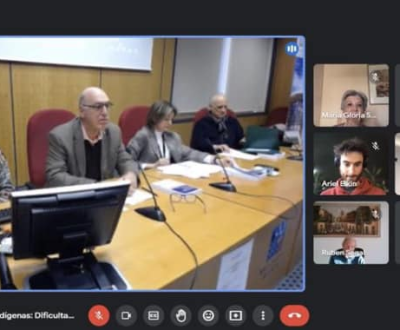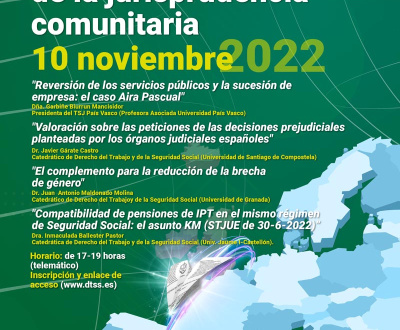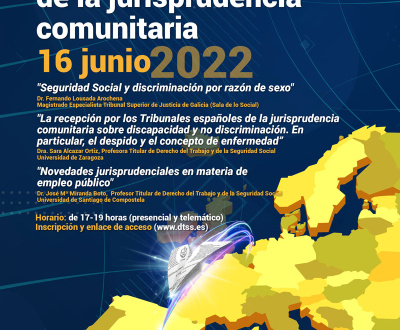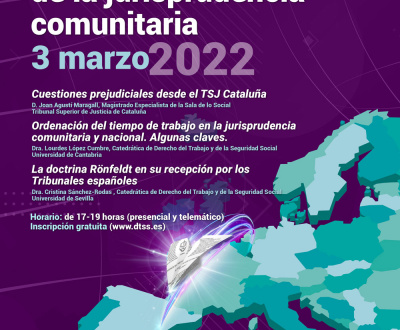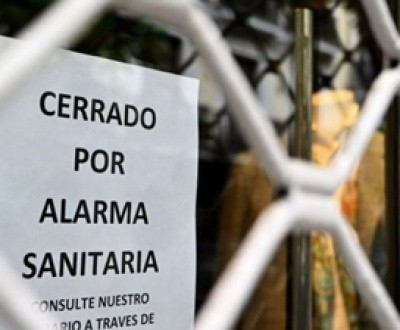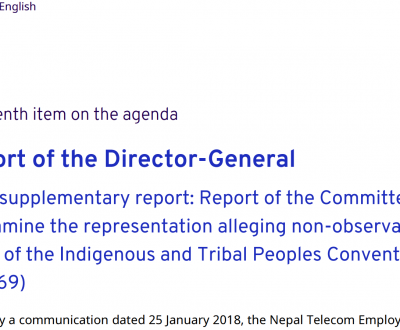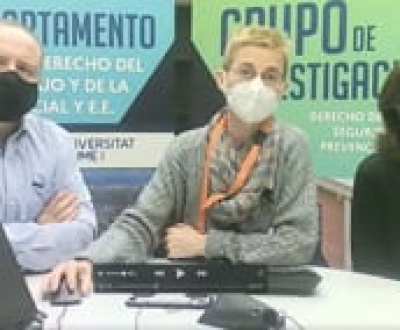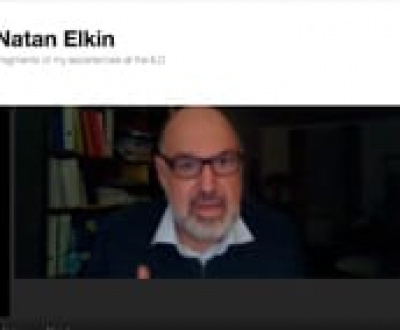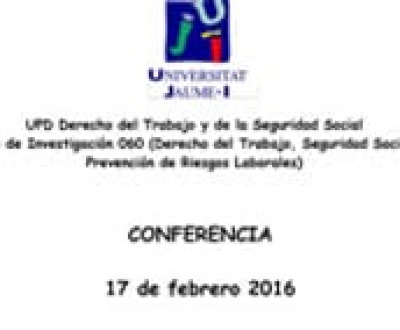International Discussion. Labor Law and Social Security post pandemic COVID-19
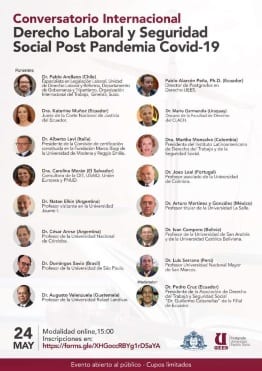
I am very honored to participate in this activity, with a qualified group of panelists, before an auditorium summoned by the Espiritu Santo University of Specialties – the UEES, of Guayaquil, which has a cooperation agreement with the Jaume I University – the UJI of Castellón.
I will now offer a summary in three parts.
First I will update you on the presentation that I had the opportunity to make about the rules related to occupational safety and health in Guayaquil in 2018. Later I will offer some guidelines to deal with the pandemic from the perspective of Labor Law and Social Security. Finally, I remember that the ILO was born in times of a pandemic and I conclude with two observations on tripartite consultations and dismissal.
…
On April 2018, I participated with the UEES in a conference on occupational safety and health before an audience composed mainly of those responsible for local companies committed to improving occupational safety and health conditions.
In my presentation, I commented on some of the difficulties of applying the international labor conventions ratified by Ecuador on OSH and pointed out that it would be advisable for government authorities, companies and unions to insist on adhering to the most recent ILO Conventions, in particular Convention No. 155 (safety and health of workers) of 1981 and Convention no. 187 (promotional framework for the occupational safety and health) of 2006. By ratifying these conventions, the country is committed to applying its provisions, which establish international parameters on occupational safety and health, and are essential during these pandemic times.
I also recalled that the most recent industrial catastrophes had led to the authorities, the representatives of the employers and the workers directly involved agreeing to take the necessary measures aimed at avoiding the repetition of industrial accidents such as the collapse of the building. Rana Plaza in Dhaka, on April 24, 2013, where there were 1,129 dead and some 2,000 injured, most of them women from small garment workshops.
It should be noted that, as a consequence of the collapse, under the auspices of the local authorities, the unions and the businessmen involved in the clothing production, including the international companies that were supplied in the miserable workshops that operated in the place, it was signed a tripartite agreement that included the international companies that were supplied in the miserable sizes that operated in the place, the Agreement on the fires and the integrity of the buildings in the garment sector of Bangladesh, extended until 2023.
As we are in the patriotic Week of May I allow myself to evoke the territory of the Viceroyalty of the Río de la Plata, to which we would have to add all of Chile (544) to add 1157 deaths by COVID in Argentina (393), Bolivia (189), Paraguay ( 11) and Uruguay (20) and reach the number of deaths that occurred in a single day in Dhaka, the Bangladeshi capital.
[Data published on May 21 at https://covid19.who.int/]
The managerial decision to delegate the maintenance and verification of the operation of the reactor to personnel who had not been adequately trained was one of the elements that contributed to the closure of nuclear plants and the usual impact on living and working conditions in a vast territory. Japan after the earthquake and tsunami that hit the shores of the Fukushima region in March 2011.
The ILO updated its doctrine regarding humanitarian catastrophes and natural disasters. In Recommendation no. 205 (Employment and Decent Work for Peace) of 2017, it is said that the promotion of full, productive and freely chosen employment and decent work are decisive factors to promote peace, prevent crises, enable recovery and enhance resilience.
In 2018, as a result of the convening of a tripartite meeting of experts, the ILO Governing Body published the “Guidelines on Decent Work in Public Emergency Services” aimed at promoting coherent measures to prevent disasters and deal with situations. emergency, access to all social protection benefits and effective labor inspection to all parties interested in the proper functioning of public emergency services.
From my perspective, the ILO offers concrete guidance for dealing with the pandemic if all stakeholders respect the principles of tripartite consultation, that is, consultations aimed at reaching agreements between government representatives, workers’ organizations and employers and their organizations.
In relation to «Post Pandemic Labor Law and Social Security», without elaborating on each of these proposals, I share the following comments:
Both unions and employers share the same objective as the authorities: the fight against the pandemic, which should lead to the construction of a «tripartite» objective: to eliminate all possibility of transmission and contagion of the virus in the workplace;
Trade union organizations and employers, due to their knowledge and experience, should propose concrete measures to restore economic production, avoid infections and reduce the spread of the new coronavirus in the workplace;
Laws adopted by parliaments that operate by videoconference and without social consensus are not going to reduce contagion in the workplace,
Labor law will continue to fulfill its traditional function of protecting people and their tools, ensuring greater listening to the problems and solutions that arise in each job.
In the face of the pandemic, governments and multilateral financial institutions have abandoned the orthodox objective of budgetary balance, which should facilitate the universal – rapid and effective – provision of basic income, income and health care, as proposed in Recommendation No. 202 of 2012, ILO standards on dismissal can serve as a conceptual framework. Except for Venezuela, Convention No. 158 has not been ratified in Latin America. Convention no. 158 and Recommendation no. 166 on the termination of the employment relationship, of 1982, recognize the right of employer to dismiss a worker for just cause and the worker’s right not to be deprived of his or her work without justification. More precisely, it is said that a temporary absence from work motivated by illness – such as COVID-19 – cannot constitute just cause for dismissal (Article 6 of Convention No. 158).
Regarding collective dismissals, consultation of union representatives and notification to the responsible authorities in the event of dismissals for economic, technological, structural or similar reasons have been foreseen. In Spain, the Minister of Labor trilled the various measures to assist companies and workers during the duration of the state of emergency with the hashtag #ProhibidoDespedir.
The 2020 pandemic
According to my reading of the events, on January 10, 2020, the Chinese authorities transmitted and the WHO received the genetic sequence of a new coronavirus. After meeting the emergency committee twice (on 21-22 and 30 January), in application of the International Health Regulations, the committee chairman, Professor Didier Houssin, who was the highest ranking official in health public in France, and the Director-General of the WHO declare a public health emergency of international importance (ESPII), that is, a pandemic caused by a new coronavirus.
In Germany, the test to identify the disease, produced on the basis of the genetic code received by the WHO, was ready in a Berlin hospital on January 16. The first identified case of COVID-19 occurred in Germany on January 27. Practicing an active policy of identifying through tests the presence of the disease, in Germany, deaths related to the new coronaviruses reach 8174 people, the lowest level of deaths among large European countries.
Indeed, although some countries have acted diligently, a large majority of policy makers did not follow the recommendations of their national legislation or the guidelines of the WHO. In France, a 2007 law had provided specific measures so that the health system is prepared to face wide-ranging health threats. Correlatively, the Ministry of Labor had published, in 2007 and in 2009, detailed ordinances to ensure the continuity of company activities and the conditions of work and employment in the event of a flu pandemic.
By the time the first two deaths occurred in Guayaquil, on March 16, the situation in Europe was diverse: in Italy, the deaths totaled 2,158 people; in Spain, the deaths reached 309 people; In Portugal, the first recorded death occurred the following day, March 17.
In August 2008, bank failures turned into a sovereign debt crisis in the euro zone, causing the daily destruction of jobs and the closure of companies in Greece, Ireland, Spain and Portugal. Under the pretext of satisfying the financial markets and obtaining better conditions to finance the public deficit, reforms to labor and social security law were imposed, without consulting or agreeing with the social partners.
No trill was heard to prohibit firing.
ILO is born in times of pandemic
At the exact time the ILO was born, Europe was suffering from a pandemic similar to the one that SARS-CoV-2 is currently causing.
In April 1918, in France, army health officials detected the first cases of a flu that affected their soldiers. In a few months, the entire population of France – and also of Germany, like the rest of Europe – were infected with the flu. It was the so-called «Spanish flu» caused by a type A virus (H1N1), a cousin not too far from the coronaviruses. Before a vaccine appeared to stop it, the Spanish flu spread for two years and caused between 50 and 100 million deaths worldwide.
The Spanish flu did not prevent the convening of a great Peace conference in Paris, which established the first international organization, the League of Nations. Simultaneously, between February and March 1919, a commission specialized in «international labor legislation» drafted part XIII of the Peace Treaty, which established the Labor Organization.
The Spanish flu did not prevent the convening of a great Peace conference in Paris, which established the first international organization, the League of Nations. Simultaneously, between February and March 1919, a commission specialized in «international labor legislation» drafted part XIII of the Peace Treaty, which established the Labor Organization.
Albert Thomas, a French personality, was appointed Director of the Labor Office.
It should be known that, in May 1915, Albert Thomas had been appointed Secretary of State in charge of «artillery and military equipment». Albert Thomas’s impulse was decisive in seeking to multiply (exactly by ten) the production of cannons. In order to achieve such an ambitious goal, the enthusiastic cooperation of industrialists and unions was essential. Albert Thomas toured the country seeking to mobilize the bosses and workers in the factories to manufacture howitzers, cannons and all the necessary materials for the war.] Thus the concept of “organized economy” arises as a joint effort of companies and unions , with the direction of government authorities, to stimulate economic production.
On the German side, the same thing happened. An industrialist, Walter Rathenau, from the family that owns the company A.E.G., organized the production of his companies to sustain the military effort. Like Albert Thomas, Walter Rathenau was a member of the Ministry of War and was responsible for the «raw materials department». In 1918, at the end of hostilities, the raw materials department had created 196 «war societies», responsible for the supply and distribution of raw materials and for setting the sale price.
The «organized economy» that had been conceived in France corresponded to the concept of «planning» developed by Rathenau.
Albert Thomas, as Director-General of the ILO, continued his activity in favor of dialogue between governments, trade union and business organizations. Foreign Minister of the Weimar Republic, W. Rathenau was assassinated in April 1922 by a precursor gang of Nazism.
The ILO retained and developed the method of associating employers, unions and governments with the ideal of promoting common goals. If universal peace was desired, universal labor standards must be established, without which there is no social justice.
To conclude: multidisciplinary evaluation of the management of the pandemic, preserve tripartite consultations and the justification for dismissal.
In due course, a multidisciplinary analysis of the way in which the pandemic has been managed in each country will have to be done and the effectiveness of the labor policy measures that have been adopted in some countries will be evaluated.
For a decade, without consensus, major labor law reforms apparently motivated by the financial and monetary crisis were introduced in many European countries. In the face of the pandemic, the current Spanish Government has repealed through Royal Decree-Law 4/2020, of February 18, one of the most controversial provisions of that 2012 labor reform, a dismissal modality that allowed accounting for sick leave. When examining the compatibility of this labor reform with Convention no. 158, ILO bodies were particularly accommodating to the conservative government of that time, which had the support of the employers’ confederations.
However, in the report of the tripartite committee which ruled in June 2014 on the adequacy of the 2012 labor reform to Convention no. 158 included an exhortation in which the conservative government was asked to “increase its efforts to strengthen social dialogue and, in consultation with the social partners, take all necessary measures to seek solutions to economic difficulties that are in accordance with the Convention. no. 158 ”( paragraph b) of the decision of the Board of Directors ).
This exhortation was not received at the time, but is regaining validity in these times of pandemic.
Reforms introduced without social dialogue, at the first opportunity, will be repealed.
To ensure their effectiveness, the labor market measures and the reform of social security systems, necessary to face economic difficulties, should always be taken in consultation with the social partners.
Two questions from Dr. Pedro Cruz, moderator
Dr. Cruz, President of the Iberoamerican Association of Labor Law and Social Security Guillermo Cabanellas, indicated that he agreed with my conclusion that there were few prospects that the labor reforms, and without social consensus, had been introduced in times of pandemic.
In addition, Dr Cruz questioned the possibility of an employer evoking as a situation of force majeure the circumstances created by the pandemic for not complying with the contractual conditions on the termination of the employment relationship. In my opinion, the circumstances created by the pandemic cannot give rise to a responsible employer taking advantage of the circumstances of the pandemic in order to fail to comply with the compensation for notice and end of services (Articles 7, 11 and 12, paragraph 1, a ) of Convention No. 158). At first, it is neither a «just cause» to dismiss a worker suffering from COVID (Article 6 of Convention No. 158) nor can the pandemic produce a «serious fault» that prevents compliance with notice and compensation for the end of services or other similar benefits provided by the employment contract or applicable national legislation.


